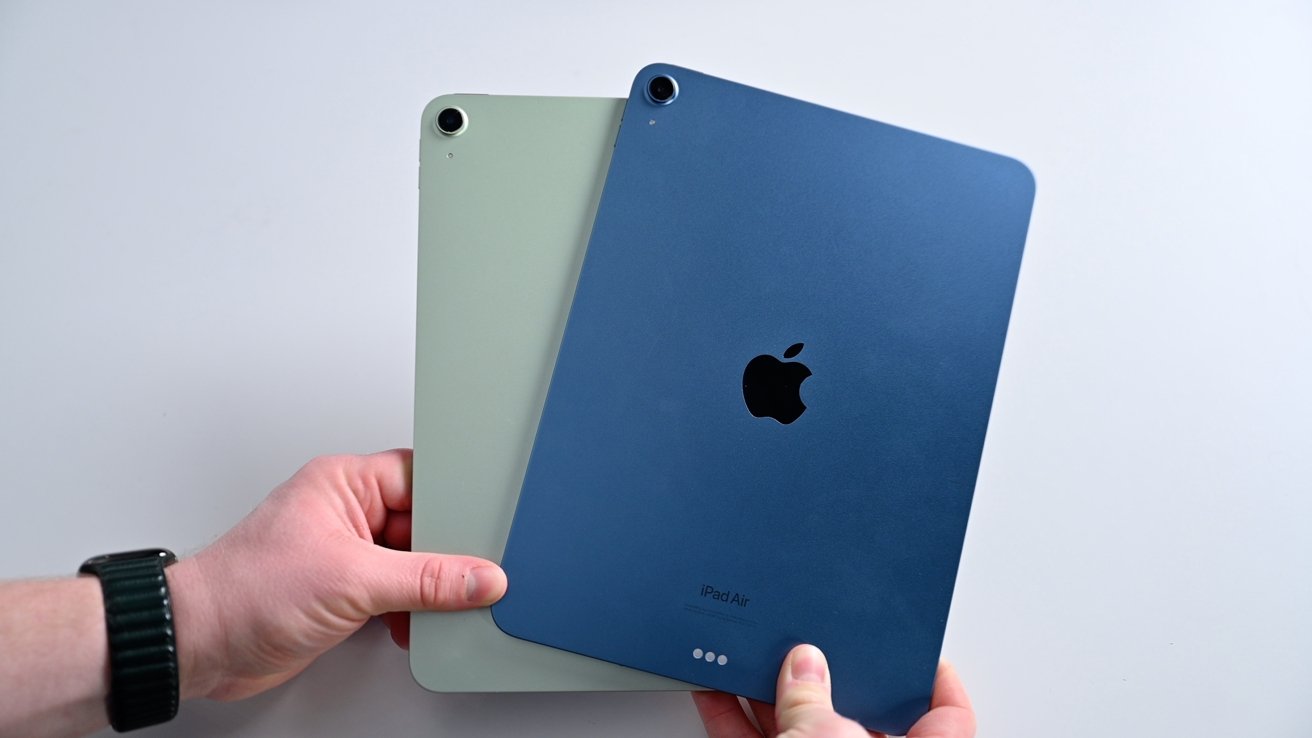
The fifth-generation iPad Air has launched with an upgrade to M1 and 5G support, but it may be a tough choice for folks that already own the fourth-generation model. Here's how the two stack up.
Apple's "Peek Performance" special event had the company reveal an update to the iPad Air, bringing it to the fifth generation. Sitting between the standard iPad and the iPad Pro, the iPad Air offered the styling of the premium model, but at a more wallet-friendly price. For the fifth-generation model, Apple closes the gap a bit more between the Air and the iPad Pro range, at least in terms of specifications.
Depending on how you look at it, there may be enough for fourth-gen owners to make the jump up to the new model.
Specifications
| iPad Air (5th Gen, 2022) | iPad Air (4th Gen, 2020) | |
|---|---|---|
| Base price | $599 | $599 |
| Screen Size (inches) | 10.9 | 10.9 |
| Resolution | 2,360 x 1,640 | 2,360 x 1,640 |
| Pixel Density (dpi) | 264 | 264 |
| Brightness (nits) | 500 | 500 |
| Display Type | Liquid Retina, True Tone, Wide Color (P3), Fully Laminated | Liquid Retina, True Tone, Wide Color (P3), Fully Laminated |
| Processor | M1 | A14 Bionic |
| Apple Pencil | Second Generation | Second Generation |
| Smart Connector | Yes | Yes |
| Dimensions (inches) | 9.74 x 7 x 0.24 | 9.74 x 7 x 0.24 |
| Weight (lbs) | 1.02 | 1 |
| Capacities | 64GB, 256GB | 64GB, 256GB |
| Rear camera (megapixels) | 12 | 12 |
| Front camera (megapixels) | 12 | 7 |
| Video recording | 4K 24/30/60fps, 1080p 240fps Slo-mo | 4K 24/30/60fps, 1080p 240fps Slo-mo |
| Connectivity | 5G (sub-6GHz), Gigabit-class LTE, Bluetooth 5.0, Wi-Fi 6 | Gigabit-class LTE, Bluetooth 5.0, Wi-Fi 6 |
| Biometric | Touch ID | Touch ID |
| Speakers | 2 | 2 |
| Port | USB-C | USB-C |
iPad Air Gen 5 vs iPad Air Gen 4 - Physical Dimensions
When Apple updated from the third-gen iPad Air to the fourth, it made considerable changes to the overall appearance. The styling shifted from the familiar iPad in favor of an almost edge-to-edge, no-chin display that was also bigger, as well as an iPad Pro-inspired casing.
With the fifth-generation iPad Air being a spec-bump edition, there's not anything new about the outside of the tablet. It has the same general appearance, down to its physical dimensions.
Both the fourth and fifth-generation models measure 9.74 inches tall and 7.02 inches wide, and an equally thin 0.24 inches in thickness. There is a little variation in weight, though.
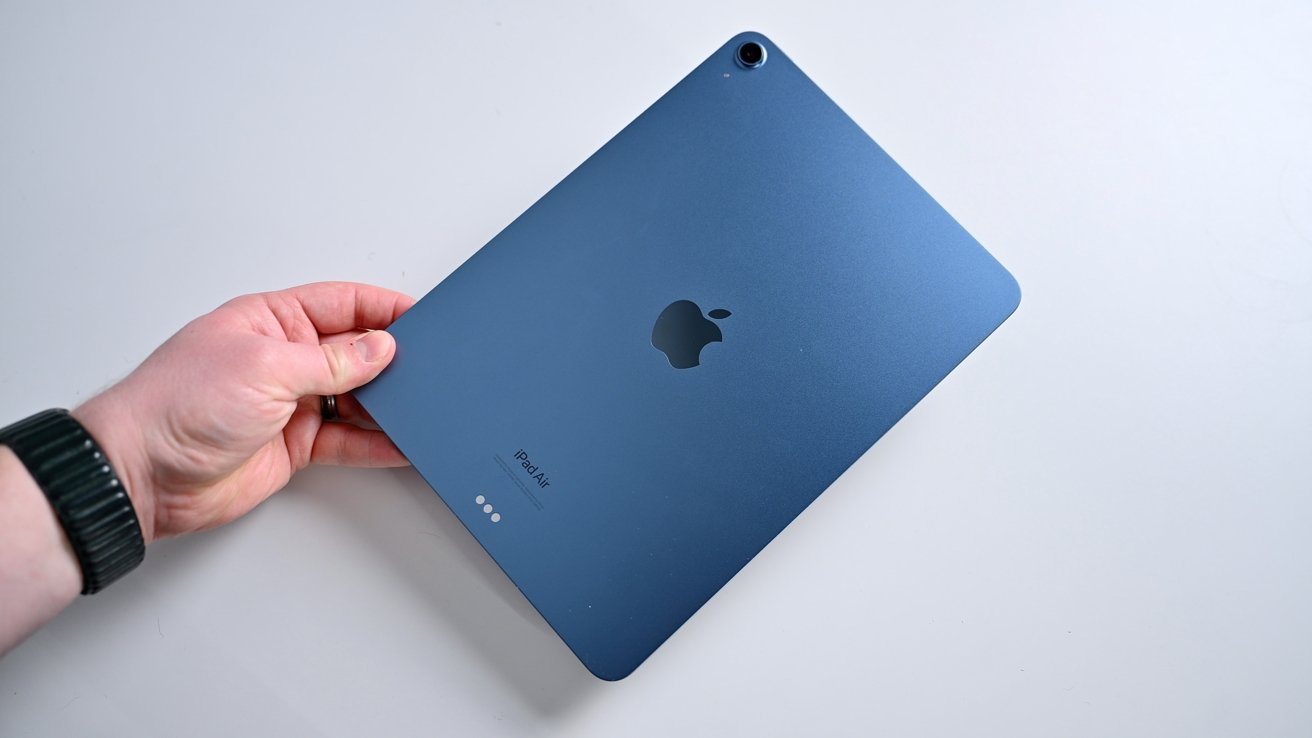
The Wi-Fi edition of the fourth-gen weighs 1 pound exactly, while the cellular is just a bit heavier at 1.01 pounds. For the fifth-gen, both Wi-Fi and Cellular models are listed at 1.02 pounds, with only a gram difference.
The newer models are heavier, but by so little that it's insignificant.
iPad Air Gen 5 vs iPad Air Gen 4 - Display
Both use the same 10.9-inch Liquid Retina display. Though Apple could've upgraded to miniLED backlighting like the iPad Pro models, it instead kept with LED backlighting.
The resolutions are the same for both models at 2,360 by 1,640, giving each a pixel density of 264ppi. You're also getting identical brightnesses at 500 nits, full lamination of the display, Wide color (P3) support, and True Tone.
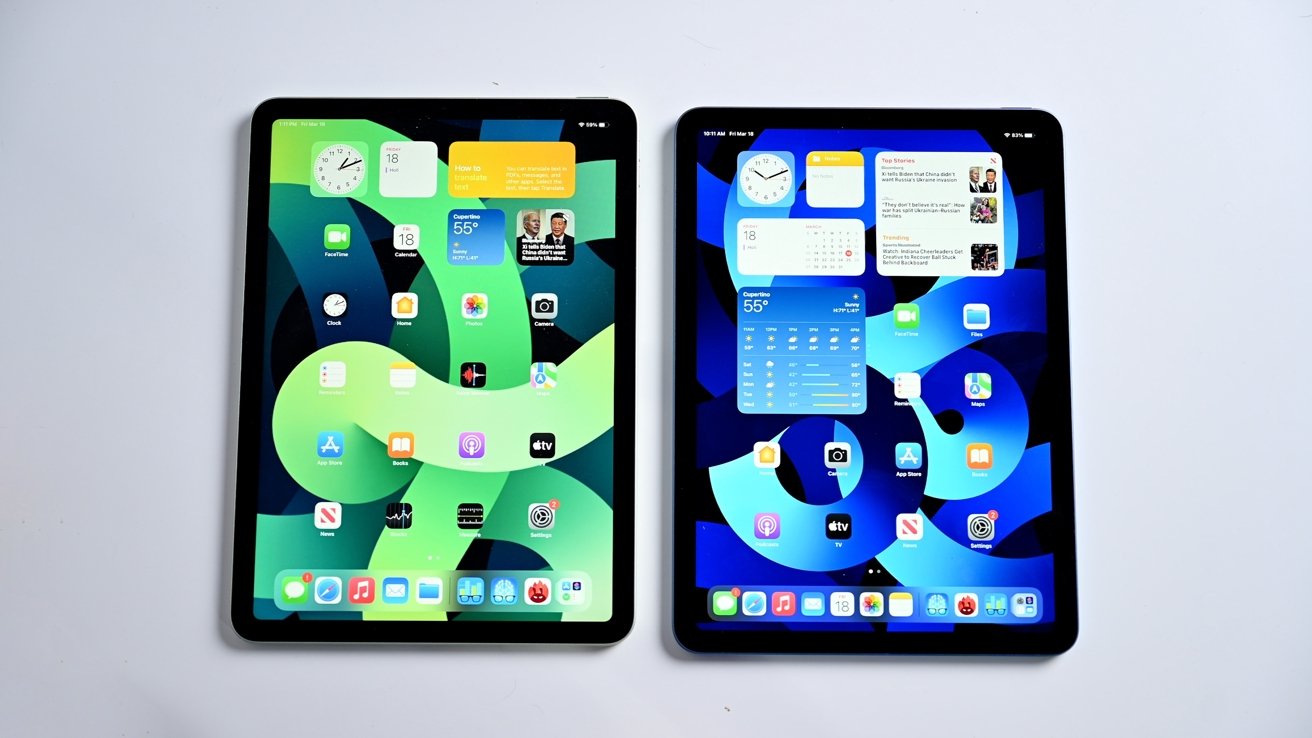
As for the Apple Pencil, Apple is maintaining the use of the second-generation stylus for the new model, just like the last one.
iPad Air Gen 5 vs iPad Air Gen 4 - Processing performance
The most significant change between the two generations is the SoC driving the two models. While the fourth-gen used the A14 Bionic, featuring a six-core CPU with two high-performance cores and four energy-efficient cores, a four-core Apple-designed GPU, and a 16-core Neural Engine, Apple took a leap for the fifth.
The latest iPad Air sports the M1, the same desktop-class chip used in the iPad Pro range. It consists of an eight-core CPU split evenly with performance and efficiency cores, an 8-core GPU, and a 16-core "next-generation" Neural Engine.
Apple says the 5th-generation iPad Air is up to 60% faster than the previous model thanks to the M1 processor. It is also claimed to have twice the graphical capabilities.
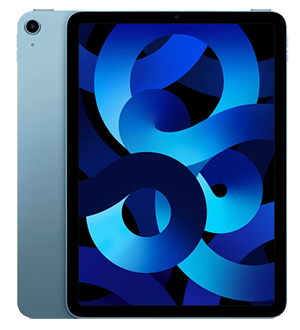
iPad Air 5
Buy at Adorama
Buy at B&H
Buy at Expercom
Ahead of benchmarks being released for the fifth-generation iPad Pro, the best immediate comparison is to turn to GeekBench and to compare the fourth-gen against the 11-inch iPad Pro.
The comparison is apt as the lower-capacity M1-equipped iPad Pro models have the same 8GB of memory as the fifth-gen iPad Air. For reference, the fourth-gen iPad Air has 4GB.
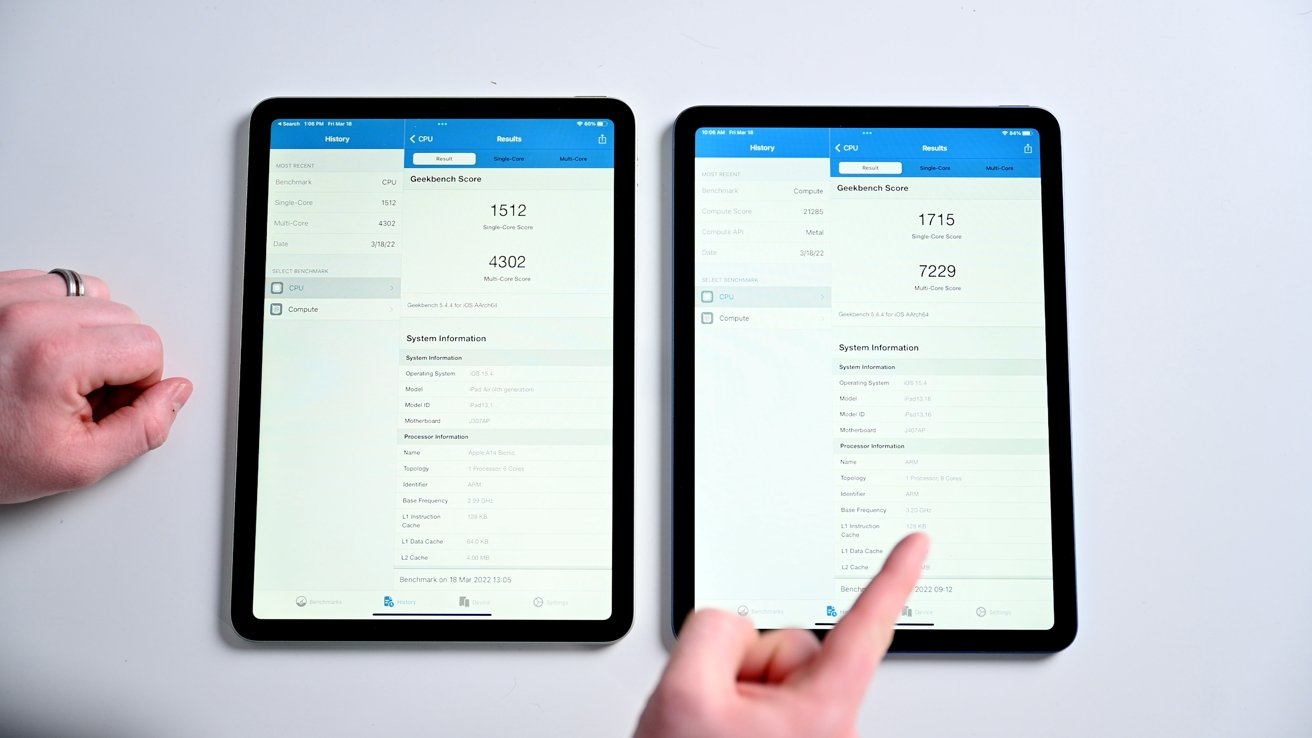
The 11-inch iPad Pro with an M1 processor runs a 1,715 single-core and 7,229 multi-core score in Geekbench. This is with the 8-core M1 processor.
Meanwhile, the iPad Air 4 with A14 Bionic scored a 1,512 single-core and a 4,302 multi-core score. The A14 Bionic has a 6-core processor, explaining the lower multi-core score.
On the graphical side, the A14 can manage 12,480 on Geekbench's Metal test, while the M1 gets to 21,285.
iPad Air Gen 5 vs iPad Air Gen 4 - Cameras
As you would expect, both rear cameras for the fourth and fifth-generation iPad Air have the same 12-megapixel Wide camera with an f/1.8 aperture, a 5x digital zoom, and Smart HDR 3 for Photos.
For video, it's a similar story, with both capable of 4K60 footage, 1080p 240fps Slo-mo, and a 3x zoom. The fifth-gen does differ in that it has an extended dynamic range for video up to 30fps.
Around the front, the 7-megapixel FaceTime HD camera has been switched out for a 12-megapixel Ultra-Wide version in the fifth-generation model. As part of the changes, it also gains a 2x zoom out.
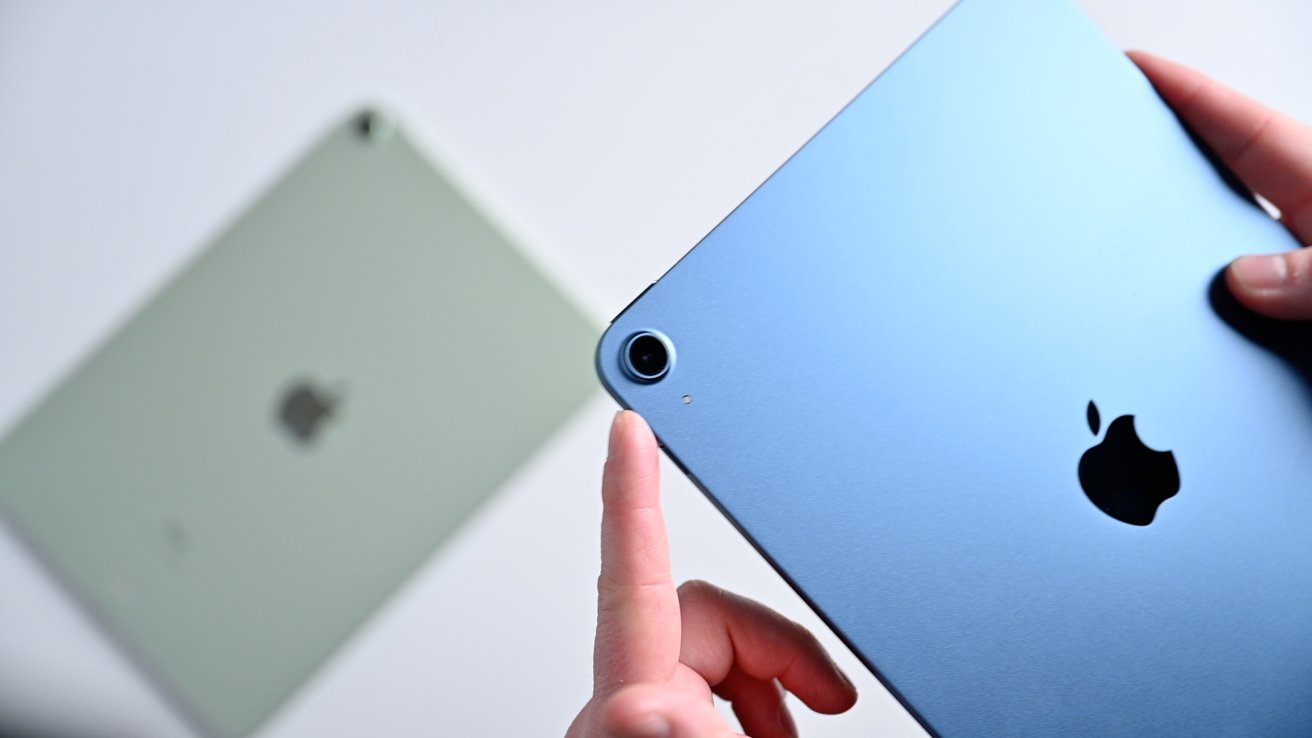
The new camera includes Center Stage support that takes advantage of the viewing angle and zoom in FaceTime.
On video, while the fourth-gen has 1080p video with cinematic video stabilization, the fifth also extends the dynamic range for 30fps video.
iPad Air Gen 5 vs iPad Air Gen 4 - Connectivity
Both models have USB-C for physical connections to devices and accessories, including video output to an external display and storage devices.
On wireless, the two models equally support Wi-Fi 6 and Bluetooth 5.0, though things change when it gets to the cellular side.
Aside from M1, Apple's second big promotional point for the fifth-generation model is connectivity over 5G. This is an improvement, but not necessarily as good as you may think.
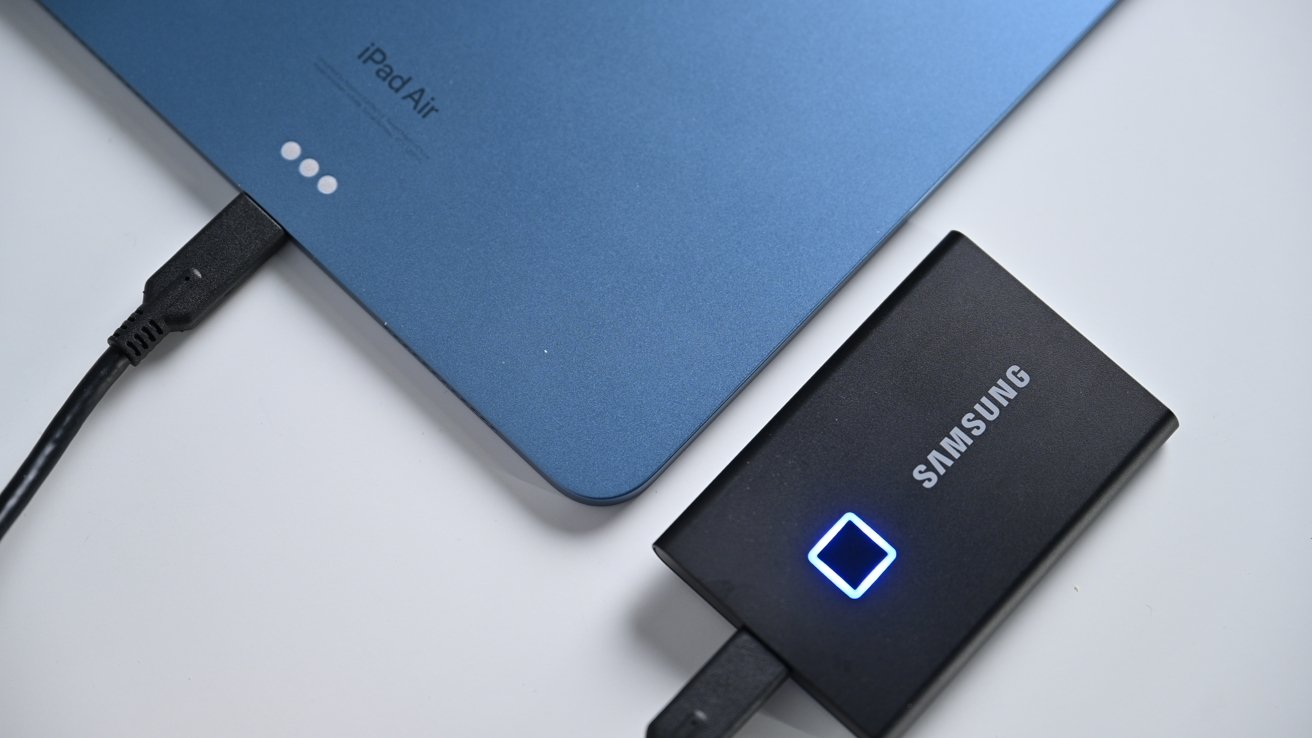
Apple specifies that the 5G support is for sub-6GHz bands, which provides blanket coverage similar to LTE. There is no support for mmWave, the extremely high-speed element of 5G that is widely marketed as an advantage of the standard.
The 5G Apple includes in the fifth-gen iPad Air is certainly faster than LTE, which it can also connect to, but it isn't the same as mmWave.
iPad Air Gen 5 vs iPad Air Gen 4 - Battery and Charging
A change in processor could sometimes equate to altered usage times. This certainly can be the case for other devices, such as iPhones. It's not happening here.
Both models stick to Apple's general tablet standard of up to 10 hours of web surfing on Wi-Fi or watching video. The number dips down a bit for cellular work, at up to 9 hours.
Power is provided via USB-C, with Apple including a 20W USB-C power adapter for each, which charges identical 28.6-inch batteries.
iPad Air Gen 5 vs iPad Air Gen 4 - Other Features
Both models continue to use Touch ID for biometric security.
The included Smart Connector can take advantage of the Magic Keyboard and Smart Keyboard Folio on each device without issue.
Audio support hasn't changed either, with both having two speakers that work in landscape mode.
iPad Air Gen 5 vs iPad Air Gen 4 - Capacity and Pricing
For the Wi-Fi version, the fourth-generation iPad Air was available in 64GB and 256GB capacities, for $599 and $749, respectively. The cellular models cost an extra $130, making the 64GB model $729 and the 256GB $879. Check out our our roundup of the best iPad deals for discounts on dozens of models.
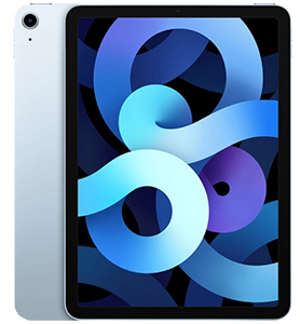
Closeout iPad Air 4 Deals
$100 off at Amazon
Deals at B&H
On sale at Simply Mac
Apple offered five color variations: Space Gray, Silver, Rose Gold, Green, and Sky Blue.
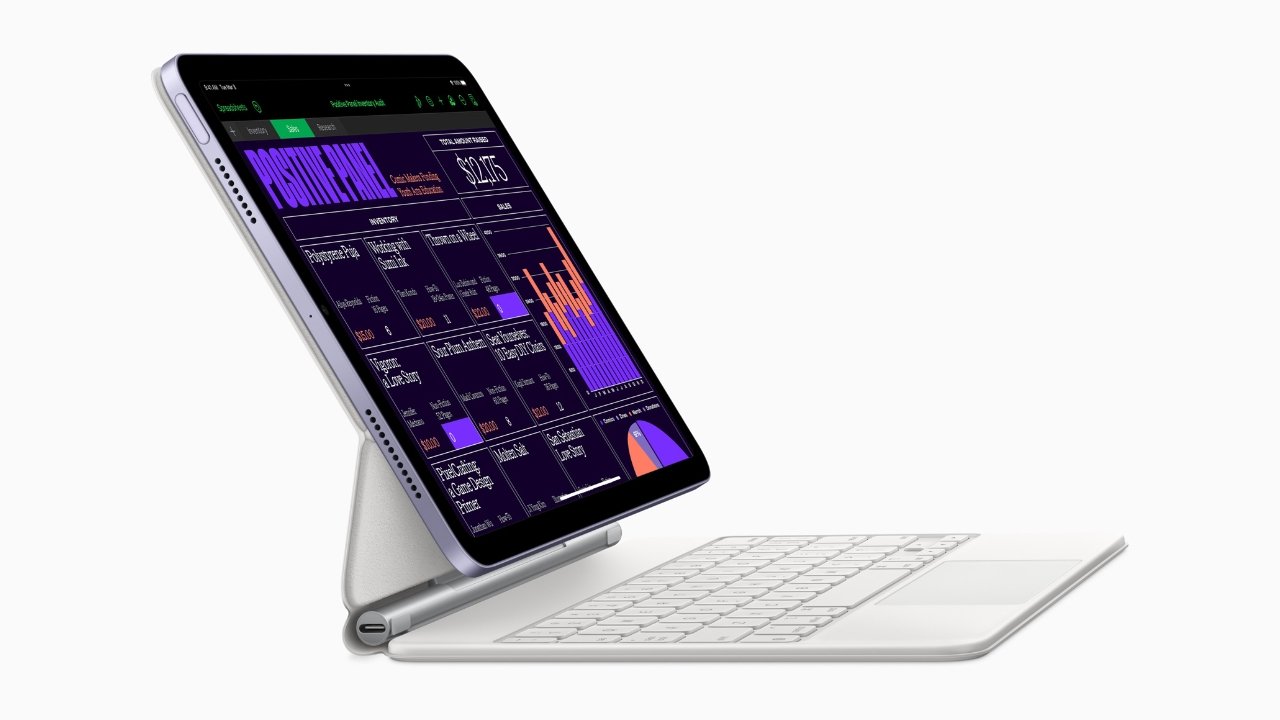
The new fifth-generation iPad Air is offered in the same capacities with the same pricing for the Wi-Fi models. The cellular models are $20 more expensive this time around, at $749 and $899 respectively.
For 2022, the color variety retains Space Gray but instead changes the remainder to Starlight, Pink, Purple, and Blue.
A cut-price iPad Pro
The modern iPad Air seemed to be a compromise, providing iPad Pro appearances but with concessions to make it cheaper. That combination made it popular in its own right, especially for those who didn't need the full-fat iPad Pro experience.
This time around, Apple's kept the impressive-looking outside but brings the internals up to par. It's not completely an iPad Pro, but it's certainly got the same chip running the entire show.
Add in the term 5G, and it becomes even more attractive, despite the lack of mmWave.
It's highly plausible that this spec-bump update could offer sufficient enough improvements to make a fourth-gen user upgrade. The performance matches the iPad Pro-like design, which is a very attractive combination for anyone who really needs that power.
It's a spec-bump upgrade, but one that bumps in exactly the right way.